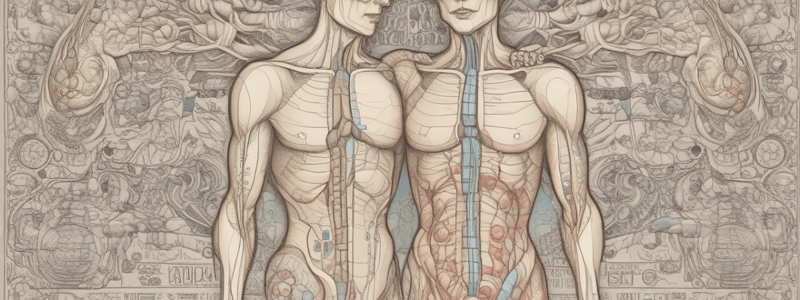Podcast
Questions and Answers
Which two systems primarily control homeostasis in humans?
Which two systems primarily control homeostasis in humans?
- Nervous and circulatory systems
- Endocrine and immune systems
- Circulatory and immune systems
- Nervous and endocrine systems (correct)
What is the primary function of the endocrine system in maintaining homeostasis?
What is the primary function of the endocrine system in maintaining homeostasis?
- To produce hormones that relay messages to other body systems (correct)
- To stimulate the immune system
- To detect changes in the body
- To regulate body temperature
Which of the following is an example of a functional mechanism to maintain homeostasis?
Which of the following is an example of a functional mechanism to maintain homeostasis?
- Presence of fat tissue to insulate internal organs
- Monitoring blood pressure
- Sweating to regulate body temperature (correct)
- Seeking shade when it's hot
What is the role of receptors in the body?
What is the role of receptors in the body?
What is the result of a stimulus being detected by the body?
What is the result of a stimulus being detected by the body?
What is an example of a behavioral mechanism to maintain homeostasis?
What is an example of a behavioral mechanism to maintain homeostasis?
What is the primary function of the hypothalamus in the body?
What is the primary function of the hypothalamus in the body?
What is the role of the pituitary gland in the endocrine system?
What is the role of the pituitary gland in the endocrine system?
How do hormones interact with cells in the body?
How do hormones interact with cells in the body?
What would happen if the hypothalamus detects a change in the body's internal conditions?
What would happen if the hypothalamus detects a change in the body's internal conditions?
What is the primary function of the endocrine glands?
What is the primary function of the endocrine glands?
What is the characteristic of hormones that allows them to regulate specific bodily functions?
What is the characteristic of hormones that allows them to regulate specific bodily functions?
What is the primary function of insulin in the body?
What is the primary function of insulin in the body?
What is the role of the hypothalamus in maintaining water balance in the body?
What is the role of the hypothalamus in maintaining water balance in the body?
What type of feedback mechanism is exemplified by the regulation of blood glucose levels?
What type of feedback mechanism is exemplified by the regulation of blood glucose levels?
What is the effect of glucagon on glycogen in the body?
What is the effect of glucagon on glycogen in the body?
What is the result of negative feedback in the body?
What is the result of negative feedback in the body?
What is the role of the hormone-receptor binding in the body?
What is the role of the hormone-receptor binding in the body?
Flashcards are hidden until you start studying
Study Notes
Maintaining Homeostasis
- Mechanisms to maintain homeostasis include structural, functional, and behavioral mechanisms
- Examples of structural mechanisms: presence of fat tissue to insulate internal organs
- Examples of functional mechanisms: sweating or shivering to regulate temperature, decreasing urine output when dehydrated, immune system response when exposed to a pathogen
- Examples of behavioral mechanisms: seeking shade when it's hot
Control of Homeostasis
- Homeostasis is controlled by the nervous system and endocrine system
- These systems detect changes and relay messages to other body systems, such as the circulatory system
- They also interact with the immune system to help keep the body disease-free
Stimuli and Response
- Stimuli that the body can detect include temperature, light, touch, smell, sound, and pain
- For every stimulus detected, there is a response, although it may not be consciously recognized
- Example: when pupils contract in response to bright light
Endocrine System
- The endocrine system is made up of glands that produce hormones
- The pituitary gland coordinates the endocrine system, responding to information from the hypothalamus
- Each gland has a specific function, produces specific hormones, and has specific actions in the body
Hypothalamus
- The hypothalamus plays a vital role in maintaining homeostasis
- It links the nervous and endocrine systems, monitoring internal conditions and controlling body temperature, metabolism, and water content
- When the hypothalamus detects a change, it secretes hormones that act on the pituitary gland
Hormones
- Hormones are chemical messengers produced in small amounts by glands and excreted into the bloodstream
- They travel through the bloodstream to cells, binding to specific receptors and activating specific responses
- Each hormone type only recognizes a specific type of receptor on cells
Feedback Mechanisms
- Feedback mechanisms describe how the body responds to a change
- Feedback can be negative (reversing the original change) or positive (producing more of the change)
- Examples: negative feedback in regulating body temperature, positive feedback in contractions during childbirth
Regulation of Blood Glucose and Water Balance
- Blood glucose regulation is controlled by insulin (lowering glucose levels) and glucagon (raising glucose levels)
- Water balance is controlled by the hypothalamus, releasing Antidiuretic Hormone (ADH) to stimulate water reabsorption in the kidneys when dehydrated
Studying That Suits You
Use AI to generate personalized quizzes and flashcards to suit your learning preferences.




